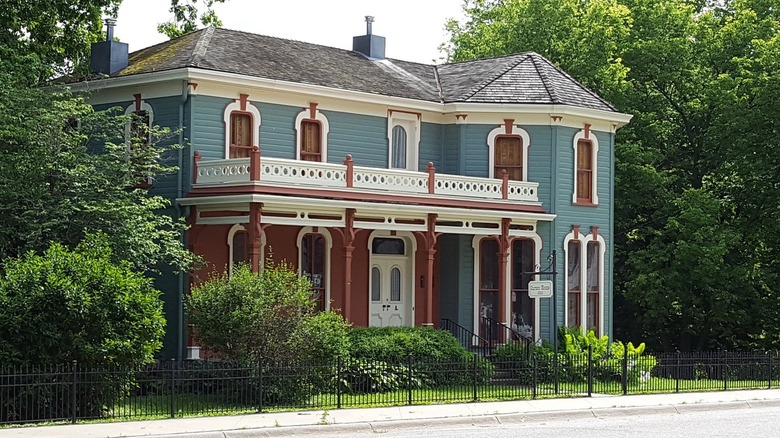3 Things You Should Know Before Buying A Home With An Unfortunate Past
With a hot real estate market that continues to give us all a run for our money (literally), buyers may be looking for ways to save cash while fulfilling their dream of homeownership. For some, this may mean considering a stigmatized property.
According to The National Association of Realtors, a home can be stigmatized because of "location, [a] murder or suicide in the house, alleged hauntings, or a notorious previous owner."
While every homeowner has a different comfort level when it comes to the previous activity in a home, we talked to the experts about what you need to know before you consider making a stigmatized property your home.
1. Ask the Right Questions
1. Ask the Right Questions
Every state is different when it comes to disclosing deaths, criminal activity, or alleged paranormal occurrences, so find out your state's laws before house hunting and talk to a licensed real estate professional for the latest updates.
Julia Kusayeva, a New York-based property appraiser, tells Hunker that homeowners should always do a quick Google search of the property before making an offer. Kusayeva also provided the following list of questions to ask sellers and their agents:
- Was there a known death/murder at this property?
- Was there a known crime that occurred at this property?
- Has this property had any known paranormal activities?
- Has this property had any known address changes or does this property have alternative addresses or multiple addresses? (This is important because stigmatized properties may have address changes to avoid the association with the stigma and keep tourists/unwanted visitors away).
- How many times has the property sold/transferred ownerships in the past three to five years?
- Does this property get any unwanted attention for any particular reason?
- What is the reason that the owners are selling the property now?
- Why is this property selling below market for this area?
A home's history is just as important as the floor plan or the finishings, and knowing the history of your future home should be added to the list of things to look for when purchasing a home.
2. Consider the Advantages of Stigmatized Properties
2. Consider the Advantages of Stigmatized Properties
Beatrice de Jong, a real estate broker and consumer trends expert at Opendoor, says that in her home state of California, sellers must disclose any death that happened on the property within the last three years, which means she comes across stigmatized properties often.
"I previously worked with a client who purchased a home that had been the scene of a tragic suicide. While the recent history was terribly sad, my buyers opted to still move forward with purchasing the home as-is and came forward with a clean offer (ie: no extra terms or conditions)," de Jong tells Hunker. "They had renovation plans and knew they could turn the house around and create new, happier memories there. I have had buyers refrain from submitting offers or withdraw offers after finding out that there was a death on the property, but also have had plenty who didn't let it stop them."
Of course, the biggest advantage of buying a stigmatized property is the price, and purchasing a home with an undesirable past could also pay off in the long run.
Kris Lippi, a certified real estate broker and owner of the real estate website ISoldMyHouse.com, tells Hunker, "If you'll be able to live in the property long enough before you need to sell it, then you might be able to sell the property at a higher price than what you bought it for. The stigma might just be forgotten by then or people might not be bothered by the stigma anymore due to the passing of time."
In highly competitive markets, buyers may be more willing to overlook a property with a stigma. However, depending on the circumstances of the stigmatized property, the deal may not be as steep as expected, so make sure you have realistic expectations.
3. Consider the Disadvantages of a Stigmatized Property
3. Consider the Disadvantages of a Stigmatized Property
The disadvantages of buying and living in a stigmatized property depend on the potential buyers. Some buyers may be okay with a death in the home but balk at the idea of a supernatural event or criminal activity.
Kusayeva says, "The cons are that you are purchasing a property with a stigma that may have psychological and emotional implications and oftentimes, these properties may require substantial renovations."
The downsides of a stigmatized property go beyond living in the home. Homes that have been the site of a recent crime or known haunting could attract visitors or unwanted attention. Kusayeva says that stigmatized homes may have been left vacant for a while, which could also attract squatters. Or, the house could have fallen to neglect.
But realtors say that there's a buyer for every home, and in some cases, buyers may even seek out stigmatized properties.
Philadelphia realtor Maria Quattrone says, "There's always the possibility of the right individual buyer coming along with a fascination for the home because of an active interest in ghosts, hauntings, or true crime. Such a novelty can actually be a draw, especially if a crime in the home involved celebrities or other famous folks. The number of people who are obsessed with true crime television shows, podcasts, and novels seems to be growing."
Buying a home under any circumstance is a big decision as it's a place where homeowners spend substantial time and resources. And while purchasing a stigmatized property is a very personal decision, homeowners can look forward to creating a positive future in any home they eventually choose.
